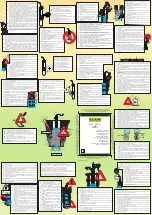
- A.2 -
ROTATION RANGE OF THE S-2 CAPSTAN
If the limit-to-limit cable travel is greater than 3.5 inches, it is possible to confuse the
autopilot by turning it on when the stick is fully deflected, in which case the servo cranks
the wrong way into the aileron stop. There is a way to avoid this possibility, but at the
cost of reduced resolution which might adversely affect tracking performance. I suggest
that, since it is most unlikely that a pilot will hold a lot of aileron at the same time he is
engaging the autopilot, there is nothing significant to worry about. If it does happen
somehow, all you have to do is put the stick anywhere in the middle half of the working
range and turn it on again. I think it is preferable to just be aware of the possibility and
use the autopilot as is.
If you prefer to remove any possibility of the above confusion, remove the servo lid and
swap the two feedback gears. One of these gears is on the shaft of the FEEDBACK pot,
which is mounted on the servo frame, and the mating gear is on the end of the output
shaft. See Fig. 4 for help in locating the FEEDBACK pot.
SETTING THE OVERRIDE FORCE
The servo Torque Control nut (the locknut inside the servo on the output shaft) sets the
override force, which is the force you feel at the stick when the servo clutch begins to
slip. If it needs to be adjusted, use a wrench on the hub of the capstan to keep the shaft
from turning along with the nut.
Set the TURN CONTROL to neutral and then push the stick hard enough to override the
servo. Set the override force to a value strong enough to give fairly good roll authority,
but not so strong as to be difficult to override. In subsequent flight tests, work toward
setting the servo slip clutch to the minimum torque necessary to give enough roll control
to handle a reasonable amount of turbulence.
If you tighten the clutch enough to exceed the 30 in-lbs maximum torque rating, you may
hear a loud clacking sound in the servo and the servo may disengage. This clacking
happens when force pushing the gears apart exceeds the solenoid's ability to hold the gear
train engaged. This is a redundant safety feature—just back off on the control nut a little
and recycle the power switch to re-engage the servo.
Summary of Contents for AP-1
Page 2: ......
Page 9: ...7 WIRING DIAGRAM FOR HAND HELD GPS AND AP 1 WITH GPS COUPLER WIRING DIAGRAM Fig 3...
Page 27: ...A 3...







































